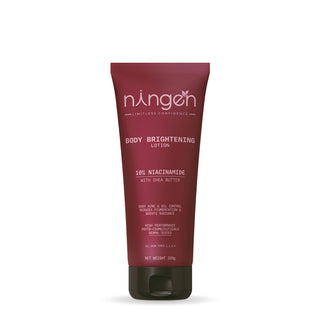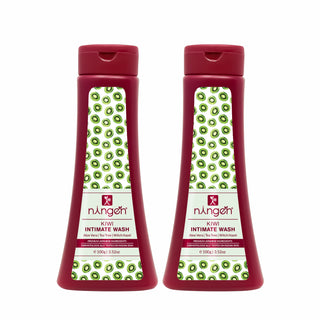Have you ever questioned the safety of your products for your most delicate areas? It’s a common concern that requires our attention, especially since intimate hygiene is crucial to overall well-being. Choosing the right intimate wash can be daunting, yet understanding its ingredients can empower you to make informed choices. In this article, 5 Ingredients to look for in intimate wash products for sensitive skin, we will explore the key ingredients that make intimate washes effective and safe, guiding you through factors to consider while selecting the right product. With a focus on reputable brands, natural ingredients, and tips for safe usage, you'll gain the confidence to protect your intimate health like never before.
In This Article;
- What Are Intimate Washes?
- Why Intimate Washes Are Important?
- 5 Best Ingredients for Intimate Wash
- Factors While Choosing Intimate Wash
- Tips for Safe Usage
- Final Thoughts
- Quick View
- Frequently Asked Questions
What Are Intimate Washes?
Intimate washes are specially formulated products designed for maintaining the hygiene of sensitive areas. Unlike standard soaps or body washes, they focus on preserving the natural balance of the intimate region, which can help prevent irritation and bacterial infections. A great intimate wash should include natural ingredients like tea tree oil, aloe vera, lactic acid, etc, known for their gentle cleansing properties and ability to maintain skin health.
Why Intimate Washes Are Important?
In the fast-paced hustle of daily life, ensuring proper intimate hygiene can often be overlooked, yet it's crucial for every woman’s health and comfort. Intimate washes are specially designed to maintain the natural pH level, preventing potential infections and irritations.
Why are they important?
-
Maintain Natural Balance: The delicate balance of the intimate area is maintained using gentle and natural ingredients like lactic acid and aloe vera, which help preserve natural moisture and prevent dryness.
-
Prevent Infections: Ingredients such as tea tree oil provide antibacterial properties, helping to fend off harmful bacteria that can cause infections.
-
Sensitive Skin Care: Intimate washes are formulated to cater to sensitive skin, avoiding the harsh effects of artificial fragrances and harmful chemicals.
-
Allergy-free Formulation: By steering clear of common allergens and mineral oils, these products reduce the risk of allergic reactions and skin irritation.
Also read: 5 long-term benefits of regular use of intimate wash.
5 Best Ingredients for Intimate Wash
When choosing intimate wash products, it’s essential to focus on safe and effective ingredients to maintain optimal intimate hygiene and reduce the risk of infections and irritations. Below are the key ingredients you should look out for:
-
Aloe Vera: Your skin's best friend
Aloe Vera is renowned for its soothing and hydrating properties. It plays a crucial role in intimate washes by providing gentle moisture and reducing dryness. Its natural composition helps calm sensitive skin, making it an excellent choice for those with inflammation or irritation issues.
Why Aloe Vera Is a Must-Have Ingredient in Intimate Washes?
Aloe vera is known for its soothing properties, making it an excellent choice for an intimate wash. It can help to calm irritation and reduce inflammation, providing comfort to sensitive areas.
-
The natural antibacterial and antifungal properties of aloe vera help maintain a healthy balance of flora, reducing the risk of infections and irritations that can occur in intimate areas.
-
Aloe vera is rich in vitamins and antioxidants, which nourish the skin and promote healing. This makes it beneficial for maintaining overall skin health in the intimate region.
-
Its hydrating properties ensure that the skin remains moisturized, reducing dryness and discomfort that some might experience with harsher cleansing products.
-
Aloe vera has a low likelihood of causing allergic reactions, making it suitable for individuals with sensitive skin or those prone to allergies in intimate care products.
-
The gel-like consistency of aloe vera allows for easy application and gentle cleansing, enhancing the user's comfort during use.
-
Aloe vera has a mild, natural scent that can provide a refreshing feeling without the use of synthetic fragrances often found in commercial intimate washes.
-
By choosing aloe vera as an ingredient, consumers are opting for a more natural and eco-friendly alternative to chemical-laden washes, aligning with a holistic approach to personal care.
-
Aloe vera can help balance pH levels in the intimate area, which is crucial for preventing issues such as bacterial vaginosis and yeast infections.
-
Regular use of aloe vera in intimate washes can lead to healthier skin in the intimate area, promoting self-care and confidence for individuals who prioritize their hygiene.

-
Green tea: A natural antioxidant powerhouse
Green tea is not just for sipping; it's a powerful ingredient in intimate care products. Rich in antioxidants, green tea helps protect the skin from oxidative stress and has anti-inflammatory properties that reduce redness and irritation. It supports the skin’s natural barrier, maintaining its health and resilience.
Why Green tea Is an Important Ingredient in Intimate Washes?
-
Green tea is rich in antioxidants, particularly catechins, which help to combat free radicals and may promote overall skin health, making it beneficial for intimate areas that require gentle care.
-
The anti-inflammatory properties of green tea can soothe irritation and reduce redness in sensitive skin, providing comfort for users of intimate washes.
-
Green tea has natural antibacterial and antifungal properties, which can help to maintain a healthy balance of flora in the intimate area, reducing the risk of infections.
-
Its astringent qualities can help to tighten and tone the skin, promoting a feeling of freshness and cleanliness in intimate washes.
-
Green tea can improve blood circulation, which may enhance nutrient delivery to skin cells, contributing to a more hydrated and healthier appearance in the intimate region.
-
The inclusion of green tea in intimate washes can offer a calming fragrance that enhances the user’s experience, providing a sense of relaxation and well-being.
-
Green tea is often well-tolerated by those with sensitive skin, making it a safe ingredient for intimate hygiene products designed for delicate areas.
-
The polyphenols found in green tea can help to regulate sebum production, which may be beneficial for individuals with oily skin in the intimate area.
-
Green tea's ability to promote cellular regeneration can aid in the healing process, making it an excellent ingredient for those who may experience irritation or minor injuries.
-
Incorporating green tea into intimate washes can elevate the product's appeal, as consumers are increasingly seeking natural and holistic ingredients in their personal care products.

3. Glycerin: The ultimate hydration booster
Glycerin is a moisturizing agent that attracts water, thereby keeping the intimate area hydrated and smooth. It serves as a humectant, locking in moisture and preventing dryness without disrupting the skin's natural barrier. Its presence in intimate washes ensures a gentle cleansing experience suitable for daily use.
Why Glycerin Is an Important Ingredient in Intimate Washes?
-
Glycerin is an important ingredient in intimate washes because it acts as a natural humectant, drawing moisture to the skin and helping to keep the intimate area hydrated. This hydration is essential for maintaining the delicate balance of the vaginal flora and preventing dryness.
-
The moisturizing properties of glycerin help to soothe irritation and discomfort, making it an ideal addition for individuals with sensitive skin or those prone to irritations in intimate area.
-
Glycerin is non-irritating and gentle, making it suitable for daily use in intimate washes without causing harm to the sensitive skin in that area. This gentleness is crucial for maintaining comfort and health.
-
As a natural substance, glycerin can help to prevent the growth of harmful bacteria, supporting a healthy microbial balance in the intimate area, which can reduce the risk of infections.
-
Glycerin enhances the overall texture and feel of intimate washes, providing a smooth and pleasant application experience. This can encourage regular use and promote better personal hygiene.
-
The ingredient is often well-tolerated, meaning that even individuals with allergies or sensitivities are less likely to experience adverse reactions, making it a safer option for intimate care.
-
Glycerin can aid in creating a protective barrier on the skin, which can help prevent further irritation from other ingredients or external factors, thus enhancing skin health.
-
In formulations, glycerin can enhance the stability and shelf-life of intimate washes, ensuring that the product maintains its effectiveness over time.
-
When combined with other beneficial ingredients such as natural extracts or essential oils, glycerin can help to enhance their efficacy, providing additional benefits in terms of soothing and cleansing properties.
-
The inclusion of glycerin in intimate washes aligns with a growing trend towards using safer, more natural ingredients in personal care products, catering to consumers who seek to prioritize their health and well-being.

4. Lactic Acid: The gentle exfoliator
Lactic acid is vital for maintaining the natural acidic pH of the intimate area, which is crucial for preventing bacterial infections. By aiding in preserving the natural balance, lactic acid helps moisture retention and protects against harmful bacteria, making it a staple ingredient for any effective intimate wash.
Why is Lactic acid an Important Ingredient in Intimate Washes?
-
Lactic acid is important in intimate washes because it helps maintain the natural pH balance of the vaginal area, which is typically acidic. This is crucial for preventing the overgrowth of harmful bacteria and yeast, and promoting a healthy environment.
-
As a gentle exfoliant, lactic acid aids in the removal of dead skin cells, which can help prevent irritation and promote smoother skin in sensitive areas.
-
Lactic acid has moisturizing properties that can help keep the skin hydrated, reducing dryness and discomfort in intimate areas, and ultimately enhancing comfort and well-being.
-
It plays a role in enhancing the skin’s barrier function, helping to protect against external irritants, allergens, and infections by strengthening the skin’s natural defenses.
-
Lactic acid also possesses mild antibacterial properties, which can help reduce the risk of bacterial vaginosis or infections by inhibiting the growth of harmful microorganisms.
-
Using lactic acid in intimate washes can help promote a more balanced microbiome in the vaginal area, supporting the presence of beneficial bacteria while minimizing harmful pathogens.
-
Lactic acid is often well-tolerated by most skin types, making it a suitable choice for sensitive intimate areas, thereby reducing the risk of allergic reactions or irritation typically caused by harsher ingredients.
-
It can contribute to a fresher and cleaner feeling, which is important for self-confidence and hygiene, especially during menstruation or after physical activities.
-
Many intimate washes containing lactic acid are formulated to modify and enhance the overall texture and fragrance, improving the user experience while ensuring health is prioritized.
-
Regular use of lactic acid might assist in managing symptoms associated with vaginal dryness or discomfort due to hormonal changes, particularly during menopause, by providing comfort and alleviating irritation.

5. Chamomile : The ultimate soothing remedy for sensitive skin
Chamomile brings its calming benefits to intimate washes, renowned for its anti-inflammatory and skin-conditioning properties. It reduces irritation and redness and provides a soothing effect, making it perfect for sensitive skin types. Adding chamomile ensures gentle cleansing and a comforting experience for every user.
Why chamomile Is important ingredient in intimate washes?
-
Chamomile is known for its soothing properties, making it an important ingredient in intimate washes to help calm irritation and reduce inflammation in sensitive areas.
-
It has natural antibacterial and antifungal properties, which can help maintain a healthy balance of flora and prevent infections in the intimate region.
-
Chamomile is gentle and safe for sensitive skin, ensuring that intimate washes formulated with this ingredient can be used without causing discomfort or allergic reactions.
-
The anti-inflammatory effects of chamomile can help alleviate symptoms of conditions such as vaginitis or other irritations, providing relief and improving comfort.
-
Chamomile offers antioxidant benefits, helping to protect delicate skin from oxidative stress and environmental factors that may cause harm.
-
Its mild, pleasant scent can provide a calming and refreshing experience during personal hygiene routines, promoting a sense of well-being.
-
Chamomile is often used in traditional medicine for its healing properties, which can be beneficial for maintaining overall vaginal health and hygiene.
-
Incorporating chamomile into intimate washes can enhance the product's appeal to consumers looking for natural and herbal ingredients, aligning with the growing trend towards clean beauty products.
-
Chamomile helps to soothe and moisturize the skin, preventing dryness that may occur with regular use of intimate washes, promoting comfort and skin health.
-
The inclusion of chamomile in intimate washes reflects a commitment to using natural ingredients, which can help promote brand trust and loyalty among consumers who prioritize holistic and gentle care for their bodies.

Factors While Choosing Intimate Wash
-
pH Balance: It’s important to choose an intimate wash that is formulated to match the natural pH level of the genital area, typically around 3.5 to 4.5. This helps maintain healthy flora and prevent irritation.
-
Sulfate-Free: Look for products that are free from sulfates, which can be harsh and strip the skin of its natural oils, potentially leading to dryness or irritation.
-
Fragrance-Free: Opt for washes that are unscented or free from synthetic fragrances, as these can cause allergic reactions or irritation for sensitive individuals.
-
Natural Ingredients: Consider washes that contain natural ingredients such as aloe vera, tea tree oil, or chamomile, which can provide soothing and antibacterial benefits without harsh chemicals.
-
Hypoallergenic Formulation: Choose intimate washes labeled as hypoallergenic, especially if you have a history of skin sensitivity or allergies.
-
Dermatologist-Tested: Products that have been tested and recommended by dermatologists are generally a safer choice, as they are likely to be more suitable for sensitive skin.
-
Moisturizing Properties: Look for washes with added moisturizers or emollients that can help keep the skin hydrated, especially if you experience dryness in the intimate area.
-
Non-Irritating: It's essential to select a wash that is gentle on the skin and designed not to cause irritation or discomfort during or after use.
-
Packaging Size: Consider the packaging size and ease of use. A bottle with a pump or nozzle can help control the amount used and reduce waste.
-
User Reviews and Recommendations: Research and read reviews from other users to assess the effectiveness and safety of the intimate wash, as real user experiences can provide valuable insights.
-
Price Point: Evaluate the cost versus quality. Sometimes, higher-priced washes offer better formulations but don’t always assume that more expensive means better.
-
Brand Reputation: Choose intimate washes from reputable brands known for their quality skincare products, as they are more likely to offer safe and effective formulations.
-
Expiry Dates: Check for any expiration dates or recommended usage timelines to ensure the product remains effective and safe to use.
Tips for Safe Usage
When it comes to using intimate wash products, safety should always be a priority. Here's a straightforward guide to ensuring you're using these products effectively and safely.
-
Read the Labels: Always check the ingredients for intimate wash products. Look for natural ingredients such as aloe vera and tea tree oil, which are gentle on sensitive skin. Avoid products with artificial fragrance and harmful chemicals.
-
Patch Test: Before applying any new intimate wash, perform a patch test. Apply a small amount on your forearm or behind your ear. Wait 24-48 hours to observe any allergic reactions or skin irritations.
-
Use Sparingly: A little goes a long way. Using too much can disturb the natural balance and lead to skin irritation.
-
Wash Gently: Avoid vigorous scrubbing, which might cause irritation. Instead, apply gently, ensuring to rinse thoroughly with water.
-
Consult a Specialist: If you experience persistent discomfort or infections, consult a healthcare professional. They can recommend the best ingredients for your skin type.
Final Thoughts
Maintaining intimate hygiene is an essential part of overall health, especially for those with sensitive skin. Choosing the right intimate wash with safe, natural, and effective ingredients such as aloe vera, green tea, glycerin, lactic acid, and chamomile ensures you’re giving your most delicate areas the care they need. These ingredients help maintain the pH balance, soothe irritation, hydrate the skin, and prevent infections, promoting a feeling of cleanliness and comfort. Remember to choose a product that aligns with your skin's needs and follow safe usage practices for optimal results. Taking these steps will help you protect your intimate health and boost your confidence every day.
Quick View
Choosing the right intimate wash is crucial for sensitive skin. Look for key ingredients like aloe vera, green tea, glycerin, lactic acid, and chamomile, which offer soothing, hydrating, and antibacterial properties. These ingredients maintain pH balance, prevent infections, and ensure comfort without irritation. Opt for products that are sulfate-free, fragrance-free, and hypoallergenic. Use intimate washes sparingly and gently to preserve the natural flora. Proper care leads to healthier skin and enhanced confidence.
Frequently Asked Questions
Q1. What ingredients should I look for in an intimate wash?
Look for natural ingredients like aloe vera, green tea, glycerin, lactic acid, and chamomile, which are gentle and effective for sensitive skin.
Q2. Why is aloe vera a good ingredient in intimate washes?
Aloe vera soothes irritation, reduces inflammation, hydrates the skin, and helps maintain the pH balance in the intimate area.
Q3. Can green tea in intimate washes help prevent infections?
Yes, green tea has natural antibacterial and antifungal properties that help maintain a healthy balance of flora and prevent infections.
Q4. What is the role of lactic acid in intimate washes?
Lactic acid helps maintain the natural acidic pH of the intimate area, preventing bacterial infections and supporting a healthy microbial balance.
Q5. Is glycerin safe for sensitive skin in intimate washes?
Glycerin is a natural humectant that hydrates and soothes sensitive skin, making it a safe and effective ingredient in intimate washes.
Q6. Why is pH balance important in intimate hygiene?
The intimate area has a naturally acidic pH (3.5–4.5) that prevents the growth of harmful bacteria. Maintaining this balance is essential for avoiding infections and irritation.
Q7. Are fragrance-free intimate washes better for sensitive skin?
Yes, fragrance-free washes are less likely to cause allergic reactions or irritation, making them a safer choice for sensitive skin.
Q8. How often should I use an intimate wash?
Use an intimate wash once a day or as recommended by your doctor. Avoid overuse to maintain the natural balance of the intimate area.
Q9. Can chamomile in intimate washes help with irritation?
Yes, chamomile has anti-inflammatory and soothing properties that reduce redness and irritation, making it ideal for sensitive skin.
Q10. What factors should I consider when choosing an intimate wash?
Look for pH balance, sulfate-free, natural ingredients, fragrance-free, hypoallergenic formulations, and dermatologist-tested products for the best results.










